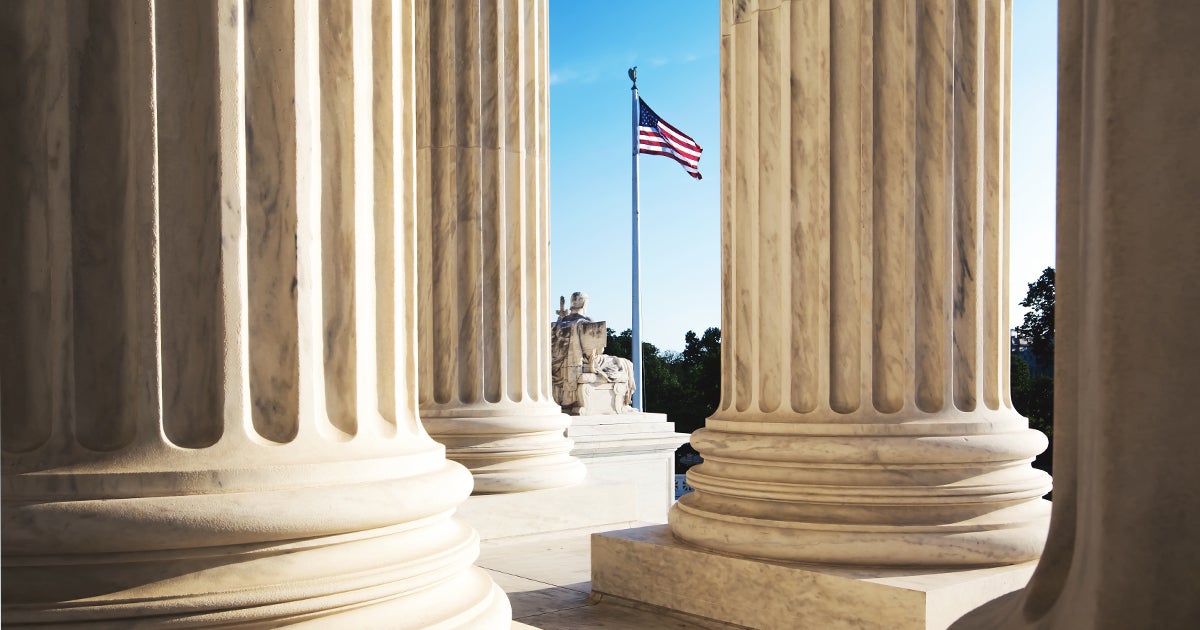
by Jorge Gomez • 7 min read
Will this be another landmark term for religious liberty at the U.S. Supreme Court? The Justices have not agreed to hear specific religious freedom cases this year. But it’s still early. There’s still a possibility that the Court will agree to hear one—including one of our own.
In the meantime, we’re keeping a close eye on 12 cases. The Court will be hearing arguments in several of these. Others are still pending review. How will these impact religious freedom?
Granted: Big Cases to Be Heard This Term
The Court has agreed to hear these:
Moody v. NetChoice, LLC & NetChoice, LLC v. Paxton: The Court will determine whether social media companies can ban content based on political or religious viewpoint.
We explained in a recent article how this case will impact religious expression online. Many religious people, groups and business are facing unequal treatment and even censorship. We’re hoping the Court will hold Big Tech companies to their own standards about “inclusivity.” Religious voices should not be suppressed on platforms that claim to be an open forum.
When one of these cases was being heard at the appellate court, First Liberty filed a friend-of-the-court brief on behalf of The Babylon Bee and Not the Bee, a Christian satire site and its non-satirical sibling. Both sites have had their content censored or shadow banned.
Loper Bright Enterprises v. Raimondo: In this case, the Court will consider whether to limit the power of the administrative state by overruling a prior decision, Chevron v. Natural Res. Def. Council.
How could this case impact religious freedom? First Liberty represents many parties and clients harmed by administrative state overreach. A favorable ruling could help religious Americans who have been kept from living out their faith by the heavy hand of government.
Federal Bureau of Investigation v. Fikre: A Muslim resident from Portland challenged his placement on the “No Fly List.” That’s the database that contains the identity information of known or suspected terrorists. The government removed him from the “No Fly List” and seeks to have the Court find the claim moot, allowing the government to avoid an adverse judgment.
How could this case affect religious liberty? First Liberty clients often face government attempts to moot, or end, their cases prematurely. A favorable ruling in this case will help us seek complete justice for all our clients.
Cases Pending Review
The Court has been asked to hear the following cases. We’re waiting for its response:
Tingley v. Ferguson: This case deals with religious liberty and free speech for counselors. It involves a challenge to Washington’s “Counseling Censorship Law,” which prohibits conversations between individuals and their chosen counselor (including religious counselors or pastors) that seek to help the client achieve comfort with his or her biological sex or to reduce unwanted same-sex attraction.
Missouri Department of Corrections vs. Finney: This case deals with religious discrimination in jury selection. Multiple Christians were excluded from a jury in an employment discrimination case brought by a lesbian plaintiff. That person’s lawyer asked the court to strike the Christian jurors, arguing that they could not be impartial due to their religious beliefs. The judge disagreed on whether they could be impartial, but struck the jurors anyway “to err on the side of caution.”
M.C. v. Indiana Dept. of Child Services: This is a case with implications for parental rights, particularly for families who want to raise their children consistent with their religious beliefs. The Indiana Department of Child Services investigated and took action against two parents who—consistent with their religious beliefs—would not use female pronouns when referring to their male child.
Vitagliano v. County of Westchester and Reilly v. City of Harrisburg: These cases deal with “buffer zones” around abortion clinics. The Court is being asked to overturn Hill v. Colorado, a troubling decision that’s been used to justify banning religious people and life-affirming advocates from counseling women in “buffer zones” outside abortion clinics.
If the Court does decide to take these cases, the outcome could have an impact in First Liberty’s federal lawsuit involving our client Wendy Faustin. Her religious beliefs motivate her to advocate publicly on behalf of unborn babies and help women in need. Our case challenges a Colorado state law and a local ordinance that impose severe, content-based restrictions on speech outside abortion centers.
Lowe v. Mills: This case involves Maine healthcare workers who brought a religious-accommodation challenge to a COVID vaccine mandate. The lower court rejected the claim on the grounds that private employers providing religious exemptions would conflict with the state mandate that contained no religious exemptions.
Matadi v. Garland: This case involves a citizen from Angola who applied for asylum claiming religious persecution in his home country. His request was denied. Lower courts ruled against him and now he’s appealing to the Supreme Court, arguing that his denial was wrong.
Biden v. Feds for Medical Freedom: Federal employees challenged President Biden’s COVID-19 vaccine mandate for Executive Branch employees. The federal government revoked the order and seeks to have the Court find the claim moot.
Kendall v. Doster: The Air Force denied several airmen religious accommodations from the COVID-19 vaccine mandate. A federal appeals court upheld a class-wide preliminary injunction protecting the airmen from being punished for their religious beliefs. In January, the Secretary of Defense rescinded the DoD vaccine mandate. The federal government seeks to have the Court find the claim moot.
In many vaccine mandate and religious accommodation cases, the government tries to have the cases declared moot to avoid an adverse judgment.
Religious Liberty Cases Denied by The Court
The Court declined to hear Craig v. Solorzano. This case involved a challenge to a divorce judgment giving sole parental rights to the mother, allegedly because of the father’s traditional Greek Orthodox views of the husband-wife relationship.